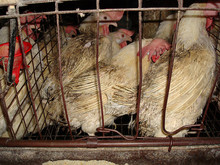 Egg-laying hens are perhaps the most abused animals on the face of the planet. This is something MFA undercover investigations in numerous states have illustrated time and time again. But, after over a decade of intense campaigning by animal advocates, change might soon be on the horizon.
Egg-laying hens are perhaps the most abused animals on the face of the planet. This is something MFA undercover investigations in numerous states have illustrated time and time again. But, after over a decade of intense campaigning by animal advocates, change might soon be on the horizon.Obviously worried by the growing awareness among consumers of the cruelties inherent in modern egg production, nervous about the increasing number of states that have curtailed the intensive confinement of egg-laying hens, including California, Michigan and Ohio, and reeling from the current efforts to ban battery cages in Washington and Oregon, the egg industry has agreed to come to the table to negotiate a phase-out of some of the worst factory farming abuses.
According to an agreement reached today, The Humane Society of the United States and the United Egg Producers, a trade group that represents the vast majority of egg factory farms nationwide, will work together to seek federal legislation requiring landmark animal welfare reforms, including:
- A federal ban on battery cages for egg-laying hens–cramped, barren wire cages so small that hens are unable to stand up, spread their wings or engage in any natural behaviors. More than 250 million hens are currently confined to battery cages in the United States.
- A requirement for egg producers to gradually increase the amount of floor space each laying hen is given to a minimum of 124 square inches per white bird and 144 square inches per brown bird (a larger breed). This would effectively double the amount of space that each laying hen is currently provided.
- A requirement for environmental enrichments for birds, such as perches, nesting boxes, and scratching areas for all hens.
- A prohibition of forced molting through starvation, an inhumane practice that involves withholding all food from birds for up to two weeks in order to shock their bodies into another laying cycle. Tens of millions of hens in the country still endure this cruelty today.
- A requirement that ammonia levels be reduced in henhouses to below 25 parts per million.
- A national prohibition on the sale of eggs and egg products that don’t meet the above requirements – meaning eggs from battery-caged hens in Mexico or elsewhere cannot be imported for sale to the United States.
- A mandate that all egg cartons disclose the method of production. For example: “Eggs from Caged Hens,” “Cage-Free,” and “Free-Range.”
If passed, these modest but meaningful reforms would be the first federal legislation to provide any protection to chickens used for food, as well as the first federal legislation relating to the treatment of any animals during their lives on factory farms. Existing federal laws pertain only to the methods of transport and slaughter of mammals, despite the fact that birds comprise more than 90 percent of the land animals raised and killed for food in this country.
Below is undercover video from a Mercy For Animals investigation into the largest egg farm in New England, exposing what the inside of most modern day battery cage factory farms look like:
In addition to the potential for these precedent-setting regulations to alleviate needless animal suffering, the agreement also sets a pathway to improve the treatment of hens in many of the largest egg-producing states, including Iowa, Indiana and Pennsylvania, that do not allow citizen-led ballot measure campaigns. Until recently, ballot measure campaigns have been the primary way animal advocates have been successful in advancing meaningful legal protections for farmed animals.
If passed, these nationwide reforms would be important strides in the right direction, but the agreement is far from perfect and consumers should be warned that “enriched cage” or “cage-free” systems are not cruelty-free systems. Male chicks, considered worthless by the egg industry, are still killed, often by being ground up alive in giant macerators. Hens will still have the tips of their sensitive beaks painfully seared off with a hot blade and when their egg production slows, they will still be cruelly slaughtered for meat or gassed and dumped in a landfill.
Consumers still hold the greatest power to alleviate the needless suffering of egg-laying hens and other farmed animals. We can choose to support kindness over cruelty at each meal by adopting a healthy and compassionate vegan lifestyle. Please visit ChooseVeg.com to learn more.